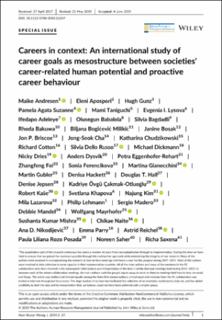Careers in context: An international study of career goals as mesostructure between societies' career‐related human potential and proactive career behaviour
Andresen, Maike; Apospori, Eleni; Gunz, Hugh; Suzanne, Pamela Agata; Taniguchi, Mami; Lysova, Evgenia I.; Adeleye, Ifedapo; Babalola, Olusegun; Bagdadli, Silvia; Bakuwa, Rhoda; Milikic, Biljana Bogicevic; Bosak, Janine; Briscoe, Jon P.; Cha, Jong-Seok; Chudzikowski, Katharina; Cotton, Richard; Dello Russo, Silvia; Dickmann, Michael; Dries, Nicky; Dysvik, Anders; Eggenhofer-Rehart, Petra; Zhangfeng, Fei; Ferencikova, Sonia; Gianecchini, Martina; Gubler, Martin; Hackett, Denisa; Hall, Douglas T; Jepsen, Denise; Çakmak-Otluoglu, Kadriye Övgü; Kaše, Robert; Khapova, Svetlana; Kim, Najung; Lazarova, Mila; Lehmann, Philip; Madero, Sergio; Mandel, Debbie; Mayrhofer, Wolfgang; Mishra, Sushanta Kumar; Naito, Chikae; Nikodijevic, Ana D.; Parry, Emma; Reichel, Astrid; Rozo Posada, Paula Liliana; Saher, Noreen; Saxena, Richa
Journal article, Peer reviewed
Published version
Permanent lenke
https://hdl.handle.net/11250/2642079Utgivelsesdato
2019Metadata
Vis full innførselSamlinger
- Publikasjoner fra CRIStin - BI [1015]
- Scientific articles [2181]
Sammendrag
Careers exist in a societal context that offers both constraints and opportunities for career actors. Whereas most studies focus on proximal individual and/or organisational‐level variables, we provide insights into how career goals and behaviours are understood and embedded in the more distal societal context. More specifically, we operationalise societal context using the career‐related human potential composite and aim to understand if and why career goals and behaviours vary between countries. Drawing on a model of career structuration and using multilevel mediation modelling, we draw on a survey of 17,986 employees from 27 countries, covering nine of GLOBE's 10 cultural clusters, and national statistical data to examine the relationship between societal context (macrostructure building the career‐opportunity structure) and actors' career goals (career mesostructure) and career behaviour (actions). We show that societal context in terms of societies' career‐related human potential composite is negatively associated with the importance given to financial achievements as a specific career mesostructure in a society that is positively related to individuals' proactive career behaviour. Our career mesostructure fully mediates the relationship between societal context and individuals' proactive career behaviour. In this way, we expand career theory's scope beyond occupation‐ and organisation‐related factors.

